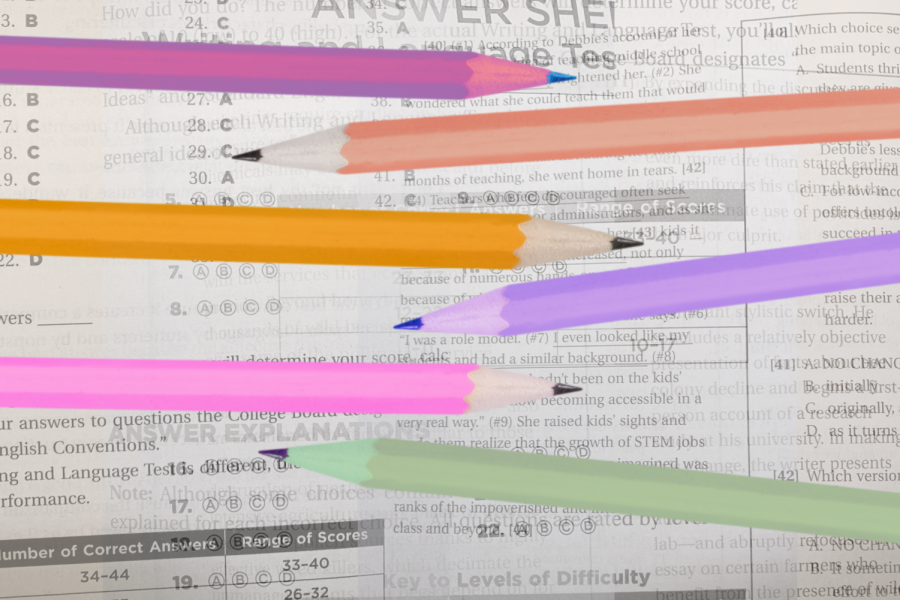WHS juniors take on the SAT
Credit: Alyssa Ao
As Wayland High School juniors approach the college application season, some are beginning the process of taking the SAT. Students use a variety of resources to prepare, including tutors, websites and practice tests. “My parents got me a tutor to help with developing strategies,” junior Tasha Janoff said. “I also use Khan Academy for practice, and it definitely has improved my score.”
April 7, 2023
The SAT, run by the College Board, is a standardized test widely used to assess high schoolers for college admissions. Students who take the SAT will be tested on their math, reading and writing skills over the course of about three hours. For some juniors at Wayland High School, the subject of the SAT can be a common stressor and conversation topic, as an SAT exam is held almost every month.
The College Board recommends taking the SAT for the first time in the spring of a student’s junior year and again in the fall before college application deadlines. For most students, retaking the test can help improve their score. Since each test has different reading passages and math problems with varying difficulties, some students feel uncertain about what is to come on the actual test.
“I took the March SAT and the reading section felt so much harder than the practice tests I’ve been taking,” junior Ava Renneker said. “There was one history passage, which is common, but it was so difficult to understand. It’s frustrating when some tests are harder than others because now I have to take it again.”
In order to help students prepare for the SAT, study guides and previous test takers have recognized patterns within every test. Common questions within the reading section include determining central ideas and themes, citing textual evidence, summarizing, understanding relationships and interpreting words and phrases in different contexts.
“My parents got me a tutor to help with developing strategies,” junior Tasha Janoff said. “I know how to navigate the reading section now and cross off answers that I know are wrong. I also use Khan Academy for practice, and it definitely has improved my score.”
Although standardized tests are not required to apply to all colleges and universities, some students find that including a test score in applications can be a substantial way for them to “stand out.” If students are interested in finding more resources to practice for the SAT, WSPN and Revolution Prep have been hosting practice SATs for a fee of $20. Some students also decide to further their practice by connecting with a tutor though Revolution Prep.
While tutors can be helpful, they can also be pricey. The average cost for SAT tutoring is $70 per hour.
“My tutor has helped a lot, but there’s only such much they can do,” Janoff said. “Having an SAT tutoring session twice a week or even weekly can really add up, so I’ve been taking breaks in between the tests I’ve taken.”
Sign ups for the upcoming SATs on May 6 and June 3 are already underway. While some WHS juniors are planning to take the SAT on these dates, others, like junior Anshuman Parulekar, have decided to switch to the ACT. Either way, students should remember that a standardized test score is not an indication of their value as a student.
“I took the SAT and I wasn’t happy with my score,” Parulekar said. “Now I’m switching to the ACT because I think it’s an easier test, and I think I will get a better score.”





![Last Wednesday, the Wayland School Committee gathered to discuss a number of topics regarding the health curriculum and Innovation Career Pathway course. Another large topic of conversation was the ways to potentially mitigate distracting cell phone usage. "These [phones] are going to distract your learning and social relationships," Superintendent David Fleishman said. "That's concrete right there."](https://waylandstudentpress.com/wp-content/uploads/2025/06/Screenshot-2025-06-04-at-9.49.31 PM-1200x886.png)



























![Troy Hoyt finishes the Boston Marathon, running for the Hoyt Foundation. T. Hoyt is the son of Hoyt Foundation CEO Russ Hoyt.
“[Running a marathon] might seem like a big thing, when it’s presented to you at first, but if you break it up and just keep telling yourself, “Yes, you can,” you can start chipping away at it. And before you know it, you’ll be running the whole 26 miles, and you won’t even think twice about it.” T. Hoyt said.](https://waylandstudentpress.com/wp-content/uploads/2025/04/C36E8761-1CBB-452E-9DF2-543EF7B1095E_1_105_c.jpeg)














































